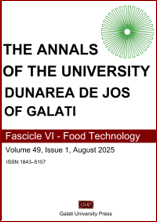Investigations on the zinc-binding capacity and functional properties of the baby clam (Corbiculidae sp.) meat protein hydrolysate
Abstract
In this research, Alcalase was employed to create a zinc-binding protein hydrolysate from baby clam (Corbiculidae sp.) meat. The hydrolysis conditions involved a ratio of 1:7 (w/v) for clam meat to water, an enzyme to substrate (E:S) ratio of 50 U/g protein, and a hydrolysis duration of 5 h. These conditions yielded a protein hydrolysate with 27.55±0.26% degree of hydrolysis (DH) and 1277.44±12.19 μg Zn2+/g protein zinc-binding capacity (ZnBC), the latter being 1.80 times lower than that of ethylenediaminetetraacetic acid disodium salt (Na2EDTA). The hydrolysate had a high concentration of hydrophobic amino acids, making up 87.43% of the total amino acids, which enhanced its emulsifying properties. In the pH range 3.0-8.0, the emulsifying activity index (EAI) and emulsifying stability index (ESI) were in ranges 61.04-72.64 m2/g and 19.63-67.46 min, respectively. The hydrolysate also demonstrated moderate foaming properties with a maximum foaming capacity (FC) and foaming stability (FS) of 21.67±1.44% and 15.83±1.44%, respectively. These findings indicate the potential for the development of a novel food supplement sourced from baby clam meat, having zinc-binding capacity, amino acids, as well as foaming and emulsifying properties.


